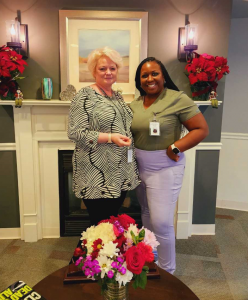Tips For Visiting A Loved One In A Memory Care Community
NEWTOWN, C.T. — February 14th through the 21st is Alzheimer’s and Dementia Staff Education Week which highlights the importance of proper education for staff educators and the care team. Athena Health Care Systems takes pride in giving high-quality care for residents across New England with the memory care diseases. We ensure all staff members have the most up-to-date Alzheimer’s and dementia care education in order to care for the residents properly.

The Commons of Newtown’s Executive Director Joanne Elser and Assisted Living Service Director Shantiza Lackran.
The Commons of Newtown – A Memory Care Community in Fairfield County, Connecticut is a dedicated memory care assisted living community. Shantiza Lackran, RN, CDP, is the Assisted Living Service Agency Director and Joanne Elser, CDP, is the Executive Director of the community. They were asked different questions on how to visit your loved in a memory care community. These are common questions they are both asked daily.
Q: What do you share with families/responsible party on how to have a meaningful visit with their loved one?
A: We believe the most important aspect of the visit is to return to being the loved one and not the caregiver. Going with your loved one to where they are in their journey. Many times, we see family members and friends trying to reorient a resident with dementia which lets them know they are wrong and it is quite demoralizing to be told you are incorrect constantly. The visit and conversation go much better when you let them lead the conversation initially and follow along.
Q: Why is visiting your loved one in a community different than previously visiting in their home?
A: In the community, you return to a mother/daughter, father/son, husband/wife, sister/brother relationships, spending quality time together instead of an adversarial conversation.
Q: Why is it important to be clear in how you communicate and put yourself in their reality during the visit?
A: It decreases agitation and anxiety for all involved.
Q: What are some things to avoid during your visit with your loved one with dementia?
A: Do not attempt to reorient a resident as their perception of reality is their reality and the visit often goes much better. Some loved ones have a problem using fiblets (little lies) to help a conversation go better and often say they do not lie to each other, which only agitates the resident and agitates the loved one. We have seen several times the resident and or loved one getting agitated and yelling at each other when the loved one tries to disagree with the person with dementia or tries reorienting them. If they say the year is 1979, then it is 1979. Try asking them what they did that day. They may ask how work was when you have not worked in six years, but you need to go with them and say, “Fine.” They may ask how the kids are and how they are doing, try to figure out what age your children would be for the resident so you can address the question. The resident with dementia often will state they need to leave to pick up the kids from school, or their husband is at work and picking them up etc.
Q: What is your advice to give to loved ones trying to cope with the disease progression of their family member?
A: Families need to understand that their loved one cannot control their thoughts or behaviors. Loved ones often get upset by their loved one’s behaviors or what they say as it was not their norm prior to getting diagnosed with dementia and cannot understand how their loved one’s mannerisms and behaviors can change so much. Families often get frustrated and angry when their loved one with dementia says something that is not correct or is exhibiting paranoia. Instead of reorienting them, they need to try to just carry on the conversation or redirect the conversation to a more pleasant one like an old memory. Sometimes a resident will start thinking their child is their husband or sister as they look like a younger version of the family member and that is where they are in their journey at that time. Behaviors are often affected by the part of the brain is affected by dementia or the type of dementia the resident has.
Q: How can the staff assist you during your visit?
A: The residents often have a rapport and trust with the staff so the staff can intervene or start a conversation with the resident and family such as, “ Lucy, why don’t you tell your family how you enjoyed the exercise this morning? We had the music going and mom had a great time laughing and moving to the music.”
The Commons of Newtown is located on a beautiful, picturesque campus overlooking a pond with safe walking trails and a dementia-friendly courtyard. All managers at The Commons of Newtown are Certified Dementia Practitioners. Daily recreational activities are offered to appeal to the social, mental, emotional, spiritual, and physical needs of the residents. Three fresh and nutritious meals are offered daily and prepared on-site in our kitchen. The community offers 56 apartments, featuring studios, and one-bedroom to two-bedroom living options with 24/7 nursing supervision. For more information on availability and to schedule your tour of your new home today, please call at 203-364-3177.
Follow Athena Health Care Systems on Twitter and Facebook & The Commons of Newtown on Facebook. Interested in a career with Athena? Click here!

